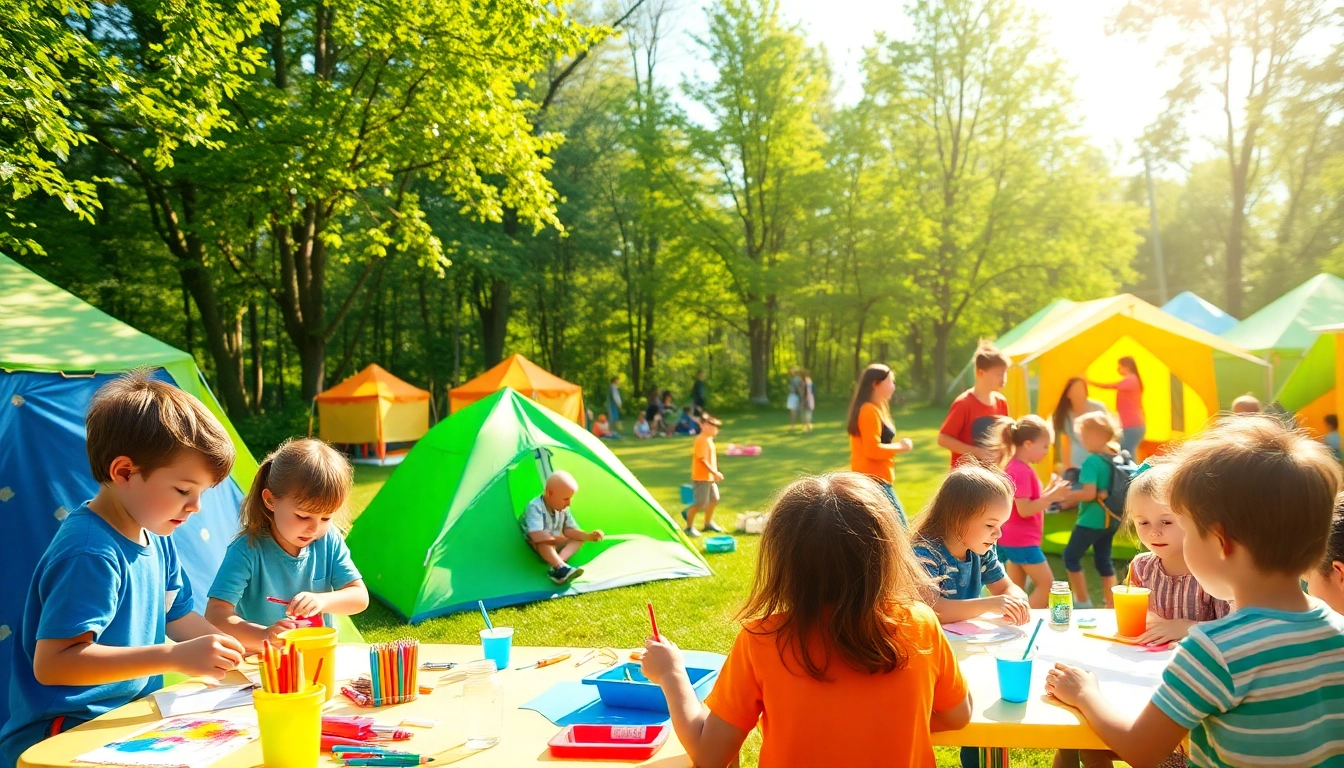
Understanding Holiday Camps
Holiday camps serve as vibrant places for children to experience creativity, adventure, and social interaction during school breaks. They are designed to provide enriching experiences far from home, with many camps featuring a range of activities and facilities. As parents look for ways to keep their children engaged during these breaks, holiday camps have gained popularity, catering to diverse interests and age groups. Whether parents wish to enroll their children in sports, arts, or general fun during vacations, holiday camps cater to a variety of needs.
Definition and Purpose of Holiday Camps
At the core, a holiday camp is a unique type of accommodation or program primarily designed for children, offering structured activities during holiday periods. It encourages young participants to engage in various pursuits, with an emphasis on making friends, developing skills, and creating lasting memories. The idea is for children to enjoy their time off from school in a safe and stimulating environment, where they can explore new interests, gain confidence, and socialize with peers.
Types of Holiday Camps Available
There is a plethora of holiday camps available, each designed to fit different interests, age groups, and skill levels. Here, we explore some of the most common types:
- Sports Camps: Focus primarily on athletic activities such as soccer, basketball, swimming, or gymnastics. These camps promote physical fitness, teamwork, and sportsmanship.
- Arts Camps: Provide opportunities for children to engage in creative arts such as painting, music, theater, or photography. These camps encourage self-expression and creativity.
- Adventure Camps: Often set in natural environments, they emphasize outdoor activities like hiking, rock climbing, and campfires, aiming to foster a love for nature and adventure.
- STEM Camps: Focus on science, technology, engineering, and math activities. These camps engage children in educational yet fun challenges that stimulate their curiosity and critical thinking skills.
- Day Camps: Aimed at younger children, these camps typically run during the day and allow participants to go home each evening.
- Resort Camps: These larger camps may include accommodation and meals, providing an all-inclusive experience that often features a wide array of activities on-site.
Benefits of Attending Holiday Camps
Enrolling children in holiday camps provides several benefits. Aside from having fun, kids can:
- Make New Friends: Holiday camps facilitate social interactions among children, fostering friendship and teamwork.
- Develop New Skills: Kids have the chance to try new activities and hone their talents, whether in sports, arts, or academics.
- Boost Confidence: Successfully participating in various activities helps build self-esteem and a sense of achievement.
- Learn Independence: Attending camps away from home helps children become more self-sufficient and responsible.
- Stay Active and Healthy: Engaging in physical activities at camp promotes fitness and overall well-being.
Choosing the Right Holiday Camp for Your Child
Finding the perfect holiday camp can be a daunting task for parents, given the multitude of options available. However, considering certain factors can help streamline the decision-making process.
Factors to Consider When Selecting a Camp
When evaluating potential holiday camps, parents should ponder over these key factors:
- Interests: Match the camp’s focus with your child’s passions—whether they are inclined towards sports, arts, sciences, or outdoor activities.
- Duration: Determine whether you need a full-day, half-day, or overnight camp, depending on your availability and your child’s comfort level.
- Cost: Weigh the camp’s costs against your budget. Look for potential scholarships or financial aid options that some camps may offer.
- Communications: Ensure the camp offers transparent communication regarding safety, activities, and emergency procedures.
- Reviews and Recommendations: Seek opinions from other parents and check online reviews to gauge the camp’s reputation and satisfaction levels.
Age-Appropriate Activities and Themes
It’s essential to select a camp that offers age-appropriate activities for your child. Programs designed for younger children focus more on play and exploration, while older kids engage in more structured skill-building and leadership opportunities. Ensure that the camp offers a variety of themes that can cater to diverse interests within each age group.
Considering Location and Facilities
Proximity to home can play a significant role in selecting a camp. Evaluate the location’s accessibility and whether transportation is provided. Additionally, assess the facilities available at the camp, including safety measures, cleanliness, and activity-specific resources (art rooms, sports fields, etc.). A well-equipped camp encourages better participation and a more enjoyable experience.
Activities and Experiences Offered at Holiday Camps
One of the most exciting aspects of holiday camps is the diverse range of activities they offer. These experiences contribute to a child’s development while ensuring fun and engagement. Below, we delve deeper into various activities commonly found at these camps.
Creative Arts and Crafts Opportunities
Many holiday camps place significant emphasis on arts and crafts, utilizing creative projects to foster imagination and self-expression. These activities may include:
- Painting and Drawing: Camps often provide supplies for traditional or innovative mediums, encouraging children to create artwork and explore techniques.
- Craft Projects: A variety of materials may be used for creating unique items, from scrapbooking to jewelry making. These hands-on tasks help develop fine motor skills.
- Theatrical Performances: Some camps include drama workshops, enabling children to act, stage plays, and even write scripts, cultivating confidence and public speaking skills.
Outdoor Adventures and Team Sports
Outdoor experiences are integral to holiday camps. They aim to boost physical fitness and instill a sense of camaraderie among campers. Notable activities may consist of:
- Team Sports: Traditional games like soccer, basketball, and capture the flag promote teamwork and communication skills.
- Adventure Challenges: Obstacle courses, ropes courses, and survival skills workshops can foster resilience and leadership qualities.
- Nature Exploration: Camps situated in natural settings often incorporate hiking, nature walks, and wildlife education, helping children develop an appreciation for the environment.
Learning Through Play: Workshops and Classes
Educational opportunities shouldn’t be overlooked, as many camps incorporate learning through fun. Various workshops could include:
- Coding Classes: STEM-focused camps may offer basic coding lessons to children, introducing them to technology and programming concepts in an engaging manner.
- Cooking Workshops: Many camps teach children how to prepare simple, healthy meals, promoting nutritional awareness and skill-building.
- Science Experiments: Hands-on science activities, such as chemistry experiments or robotics, can ignite curiosity and encourage problem-solving skills.
Tips for Preparing for Holiday Camp
Preparation is crucial to ensuring a successful and enjoyable holiday camp experience. Here are tips to help navigate this journey effectively:
Packing Essentials for a Successful Camp Experience
Creating a packing checklist can make it easier to ensure your child brings what they need for camp. Common essentials include:
- Appropriate clothing for activities and weather conditions
- Personal items, such as toiletries and medications
- A reusable water bottle to stay hydrated
- Sun protection items, including hats and sunscreen
- Comfort items, such as a favorite stuffed animal, especially for younger campers
Setting Expectations with Your Child
Having conversations with your child about their upcoming camp experience is vital. Discuss the activities they might encounter, the importance of making friends, and how to express their feelings. Setting clear expectations helps reduce anxiety, making the transition smoother.
Building Excitement: Pre-Camp Activities
In the days leading up to camp, generate excitement by engaging in fun pre-camp activities together. This could include reading books about camp adventures, visiting the camp’s website together, or even attending a pre-camp orientation if available. Building enthusiasm can help children develop positive feelings toward their upcoming experiences.
Making the Most of Your Holiday Camp Experience
Once enrolled, maximizing the holiday camp experience can significantly enhance your child’s time. Here are few insights on how to do just that:
Engaging with Camp Staff and Counselors
Encourage your child to interact openly with the camp staff and counselors. These adults are trained to facilitate experiences and can provide support or guidance as needed. Building rapport with counselors can help children feel more secure and excited to participate in different activities.
Encouraging Social Interaction Among Campers
While at camp, campers should be encouraged to forge friendships and work in teams. Parents can help by reinforcing the importance of sharing, cooperation, and creating an inclusive environment. Attending camp fairs or meet-and-greets ahead of time can also help children meet fellow campers, providing a familiar face when camp begins.
Post-Camp Reflections: Sharing Memories and Lessons
Finally, encourage your child to share their camp experiences once home. Discussing their favorite activities, new skills learned, and friends made can reinforce their memories and lessons. This reflection can also provide insight into their experiences, whether it’s positivity or concerns that may need addressing for future camp endeavors.







